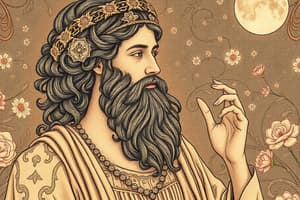Podcast
Questions and Answers
Who are some philosophers mentioned in the text regarding the self?
Who are some philosophers mentioned in the text regarding the self?
Socrates, Plato, Aristotle, St. Augustine, Rene Descartes, John Locke, Karl Marx, David Hume, Gilbert Ryle, Sigmund Freud, Paul Churchland, Merleau-Ponty.
What is the Socratic method?
What is the Socratic method?
A dialogue between the soul and itself.
According to Socrates, an unexamined life is worth living.
According to Socrates, an unexamined life is worth living.
False (B)
What does Plato believe about social interactions?
What does Plato believe about social interactions?
According to Aristotle, what are the three parts of the soul?
According to Aristotle, what are the three parts of the soul?
How did Aristotle define man?
How did Aristotle define man?
What does the term 'self-awareness' refer to in the context of the text?
What does the term 'self-awareness' refer to in the context of the text?
Flashcards are hidden until you start studying
Study Notes
Philosophical Perspectives on the Self
- Socrates introduced the concept of "Know thyself," emphasizing self-examination as essential for a meaningful life.
- He believed that the self functions as a "questioner" and that an unexamined life lacks worth.
- The Socratic method involves a dialogue within oneself, fostering self-awareness and personal responsibility.
Plato's View of the Self
- Plato posited that understanding human nature leads to individual happiness and societal stability.
- He argued for the importance of social interactions, stating that individuals are not self-sufficient.
- Plato categorized the soul into three parts:
- Reason: seeks knowledge and philosophical understanding.
- Appetite: physical urges that, when unchecked, lead to materialism.
- Will: encompasses emotions and passions, motivating the pursuit of reputation.
- Good societies nurture good individuals, which in turn contribute to the flourishing of society.
Aristotle's Concept of the Soul and Self
- Aristotle declared that the soul is essential to the self and is immortal and independent of the body.
- Defined man as a rational animal, highlighting the unique ability to think and exercise free will.
- Differentiated three types of souls:
- Plant Soul: related to nutrition.
- Animal Soul: associated with basic sensations and movement.
- Human Soul: characterized by reason and intellect.
- Stressed the natural function of life as procreation and fostering beings similar to oneself.
Development and Understanding of the Self
- The quest for understanding oneself is a foundational aspect of human existence, intensified in contemporary society.
- Self-awareness involves recognizing the emotions and behaviors that define personal identity.
- Activities, such as self-reflection exercises, encourage individuals to analyze their characteristics and the influences that shape them.
Influence of Other Thinkers on the Self
- Other notable philosophers discussed include:
- St. Augustine: explored self-consciousness and the role of divine influence.
- René Descartes: posited "I think, therefore I am," connecting thought with existence.
- John Locke: introduced the idea of self as a collection of experiences and memories.
- Karl Marx: examined the self in terms of societal and economic structures.
- David Hume: argued for a more empirical and less metaphysical understanding of self.
- Gilbert Ryle: critiqued Cartesian dualism, promoting a more practical perspective.
- Sigmund Freud: explored the unconscious aspects of self, introducing psychoanalysis.
- Paul Churchland: focused on the neurobiological components influencing behavior and identity.
- Merleau-Ponty: emphasized the embodied experience as central to understanding the self.
Studying That Suits You
Use AI to generate personalized quizzes and flashcards to suit your learning preferences.




